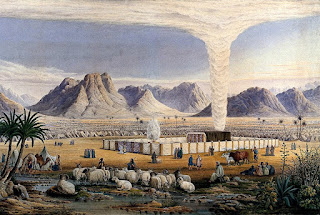Parashat Bechukotai
Torah: Leviticus 26:3 - 27:34 (Chazak!)
Haftarah: Jeremiah 16:19 - 17:14
Iyar 22, 5784 / May 31 - June 1, 2024
-----------------------------------------------------------
In honor of my upcoming birthday, I have created a mini-fundraiser for Temple B'nai Hayim on Face Book. If you would care to donate, you may do so here:
This d’var torah is offered for a refuah shleimah for Sarah Raizel bat Elisheva, Elie Ya'akov ben Pesha Leah, and Yaffa bat Blimah.
This d’var torah is offered for a refuah shleimah and a speedy and safe return of all the hostages being held by Hamas.
This d’var torah is offered for a refuah shleimah for all who have been wounded in the terrorist attacks and in fighting against the terrorists, as well as innocent non-combatants caught in the crossfire.
---------------------------------------------------------------------
Lunch and Learn meets Mondays at 12:30 PM on Zoom and Facebook Live. No meeting on June 3. On June 10, we'll be at BT Shabbat 152b, page 211 of Ein Ya'akov (Glick edition) Volume 1:
'...א"ר אבוהו כל שאומרים בפני המת'
"R. Abuhu said: "Whatever is said in the presence of a dead body..."
Please pass this on to a friend - and please cite the source.
--------------------------------------------
IN THE PRESENCE OF THE PRESENCE
"And I will set My tabernacle amidst you; and My soul shall not abhor you." Leviticus 26:11
The Hebrew word for tabernacle, mishkan, has the same root as the word shekhinah, meaning "Divine Presence" or "Sheltering Presence". The idea is that the Shekhinah dwells in the mishkan. (See also Exodus 29:45 - "And I will dwell [v'shakhunti] among the people Israel") So, where was the Shekhinah before the tabernacle was built? And where has it been since the destruction of the Temple in Jerusalem? More particularly, where has it been during all the travels and travails of the Jewish people?
The answer is in the verse itself. Read it as "I will set My Presence amidst you." Wherever and whenever we are, the Shekhinah, God's Sheltering Presence, is always in our very midst.
In traditional siddurim, one finds the bedtime Sh'ma. Within that set of prayers before sleep there is this reference to four angels and the Shekhinah: "In the name of the Lord, the God of Israel, may Michael (the one like God) be at my right hand; Gabriel (God is my strength) at my left; before me, Uriel (God is my light); behind me, Raphael (God heals); and above my head, the Divine Presence of God."
The late Rabbi Shlomo Carlebach set this to music, and it sounds like a sweet lullaby. You can hear it here, performed by Reb Shlomo:
The Hebrew words, transliteration, and translation are available here:
It can be a very pleasant and relaxing experience to quietly recite or chant this prayer. Wherever you are, wherever you lay your head, know this - the Shekhinah is with you.
Rest easy.
Shabbat Shalom.
Rabbi Richard A. Flom
Rabbi Emeritus, Temple B’nai Hayim
.הרחמן הוא יברך אותנו כולנו יחדי בברכת אחוה ובברכת אהבה ובברכת שלום
May the Merciful One bless us, all of us as one, with the
blessing of brotherhood, the blessing of love, and the blessing of peace.
----------------------------------------------------
My weekly divrei torah are
available through free subscription to the Cyber Torah e-mail list. No salesman will call! Cyber Torah list management:
To subscribe to Cyber Torah, send an e-mail from the receiving
address to: ravflom@sbcglobal.net
with the heading “Subscribe Cyber Torah”.
To unsubscribe from Cyber Torah, send an e-mail from the
receiving address to: ravflom@sbcglobal.net
with the heading “Unsubscribe Cyber Torah”.
To dedicate a Cyber Torah in honor of a simchah in memory of a
loved one or for a refuah shleimah, send an e-mail to: ravflom@sbcglobal.net with
the heading “Dedicate Cyber Torah” and provide details in the message
body.





